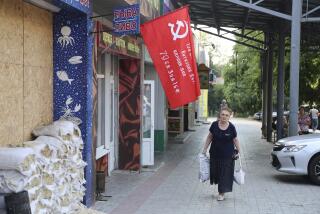Animosities Prevail as Bosnian Elections Begin
- Share via
SREBRENICA, Bosnia-Herzegovina — Under the watch of NATO peacekeeping troops, tens of thousands of Bosnians voted Saturday in municipal elections that could restore local political power to ethnic communities expelled from their homes during Bosnia’s 3 1/2-year war.
The $50-million, two-day vote is seen by U.S. and European officials as a crucial step in rebuilding the country and preventing renewed warfare. But the tension and political fighting leading up to and continuing through the first day of voting illustrated the depth of unhealed animosity.
An additional 3,000 troops of the North Atlantic Treaty Organization’s peacekeeping force were deployed in Bosnia on rural roads and in disputed cities. One explosion on the eve of the vote caused minor damage but no injuries at a political party office in Sarajevo, the capital, and several incidents of verbal harassment of minority voters were reported Saturday.
Not surprisingly, most of the trouble Saturday occurred in areas where hard-line ruling nationalists face likely defeat at the hands of refugees registered to vote where they lived before the war. Ensuring that winners actually take office will be the next major challenge for international mediators.
Here in Srebrenica, the Bosnian Serb nationalists who seized the eastern town two years ago under the direction of their former president, Radovan Karadzic, now fear that they will be outvoted by the Muslims they expelled.
In a back room at Srebrenica’s Dom Kulture center, across the street from the ruins of a mosque, members of Karadzic’s dominant Serbian Democratic Party (SDS) scoured voter-registration lists Saturday for Muslim names, checking against a Red Cross book with the names of thousands missing from the war. They contend that many of the names appear on both lists and that the missing, many of whom are presumed dead, were added to voter registration lists to inflate the Muslim voting strength.
“Either you remove the [Muslim] names from the voter lists and we win, or you remove the stigma that says we killed these people,” said Momcilo Cvijetinovic, the local SDS chief and the party’s leading candidate in the city council elections.
The SDS hopes to make a case for ignoring the election results in Srebrenica, whose fall to the Bosnian Serb army led to one of Europe’s worst atrocities since World War II--the disappearance and suspected slaying of thousands of Muslim men and boys--and earned Karadzic an international indictment on genocide charges.
A few miles away Saturday, Muslims expelled from Srebrenica in the July 11, 1995, Serbian takeover were bused to an isolated voting station near a village called Zutica to cast their ballots.
Elderly men, women in traditional Muslim baggy pants, and even a few former soldiers passed gingerly under the scrutiny of about two dozen Bosnian Serb police officers--and at least as many U.S. soldiers and international police monitors--to vote.
They were made to walk across a 20-foot bridge of splintered wooden beams over the Jadar River to a white metal container sitting in a field alongside the jagged shells of bombed-out Muslim homes. That was their voting booth.
The police permitted just two Muslims at a time on the bridge; only by crossing the river did the refugees technically enter the Srebrenica municipality. It was necessary to hold the vote miles from the city center to ensure security and prevent clashes, organizers said.
“We are allowed just one step into our municipality,” said 55-year-old Fazlic Munib, who made that step on a crutch. “But we hope it is the first step to reaching Srebrenica. We will get there sooner than you think.”
In a scenario similar to that in Srebrenica, Bosnian Croat nationalists stand to lose elections in six cities they seized during the war where Bosnian Serb populations, expelled and living as exiles, outnumber Croatian settlers. The largest is Drvar, near Bosnia-Herzegovina’s border with Croatia, where Bosnian Croat poll workers Saturday attempted to prevent bused-in Bosnian Serbs from voting by claiming that they couldn’t understand the Cyrillic letters on the Serbs’ identification cards.
“The Croats were processing about four Serbs an hour. It was ugly,” said Robert Gelbard, the U.S. special envoy for Bosnia, who helicoptered to Drvar to intervene.
More than 1,000 Serbs attempting to vote in Drvar were stranded on roads to the polling stations after nightfall Saturday, according to election organizers, who announced a five-hour extension of voting hours until midnight.
If Muslims do win in Serb-held Srebrenica, and Serbs in Croat-held Drvar and elsewhere, it remains unclear how the new city councils can be installed to rule over hostile populations. Although municipalities control little more than utilities and garbage collection, they could remove many of the obstacles that have prevented the return of refugees across ethnic lines, as required under the 1995 peace accords that ended Bosnia’s war.
“Are you going to have NATO drive these guys every morning to their city council offices and then guard them all day?” asked one international official. “You will have governments in exile, and the senior nationalists who were already running things in these municipalities will continue to run the show.”
International officials in charge of implementing the peace accords say municipalities that do not accept the election results will be sanctioned and denied economic aid. But such threats have proved meaningless in the past. The nationalists are threatening to stage demonstrations or make the towns ungovernable.
“It would be chaos, chaos,” warned Danko Mirovic, an official of the SDS in Srebrenica. “It would be an effort to reconcile the irreconcilable.”
According to confidential data, about 55% of the people who registered to vote in Srebrenica are Muslims and about 45% are Serbs. The difference is just 2,500 votes, sources with access to the data said.
Trouble also was brewing in the disputed northern city of Brcko, where angry Bosnian Serbs last month attacked U.S. troops. An estimated 3,000 Serbs who were ruled ineligible to vote in Brcko insisted Saturday that they be allowed to cast ballots in the city’s elections. International election officials ordered a polling station closed when they discovered local Serbian election officials handing out Brcko ballots to ineligible voters.
Under the rules, those voters are supposed to cast ballots in their prewar towns. But the Serbs want to maintain control of Brcko, a strategic city on the Sava River, and want their refugees who have settled in Brcko to vote in that city, where registered Muslim and Croat voters--most of whom were expelled when Serbs seized the city in 1992--hold a slight edge over the registered Serbs.
More to Read
Sign up for Essential California
The most important California stories and recommendations in your inbox every morning.
You may occasionally receive promotional content from the Los Angeles Times.











